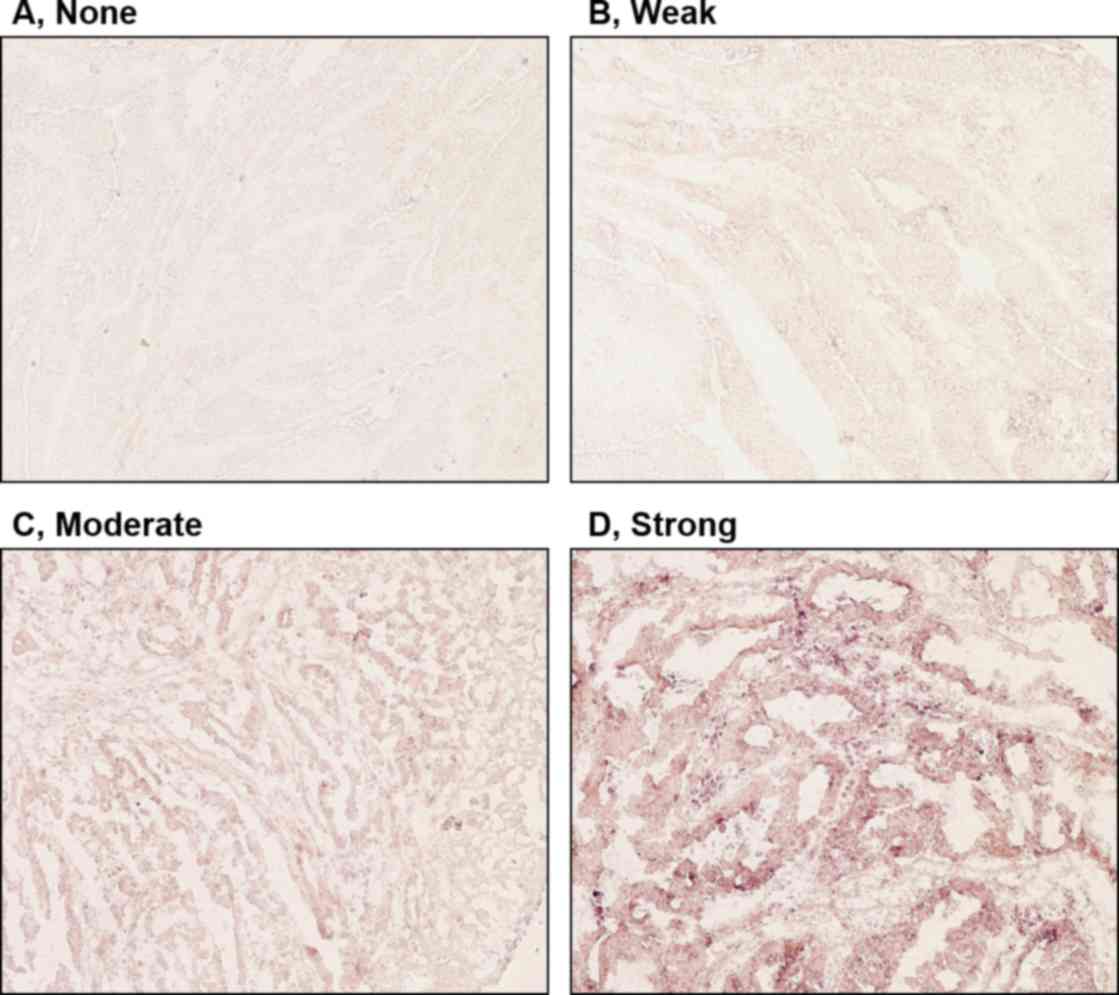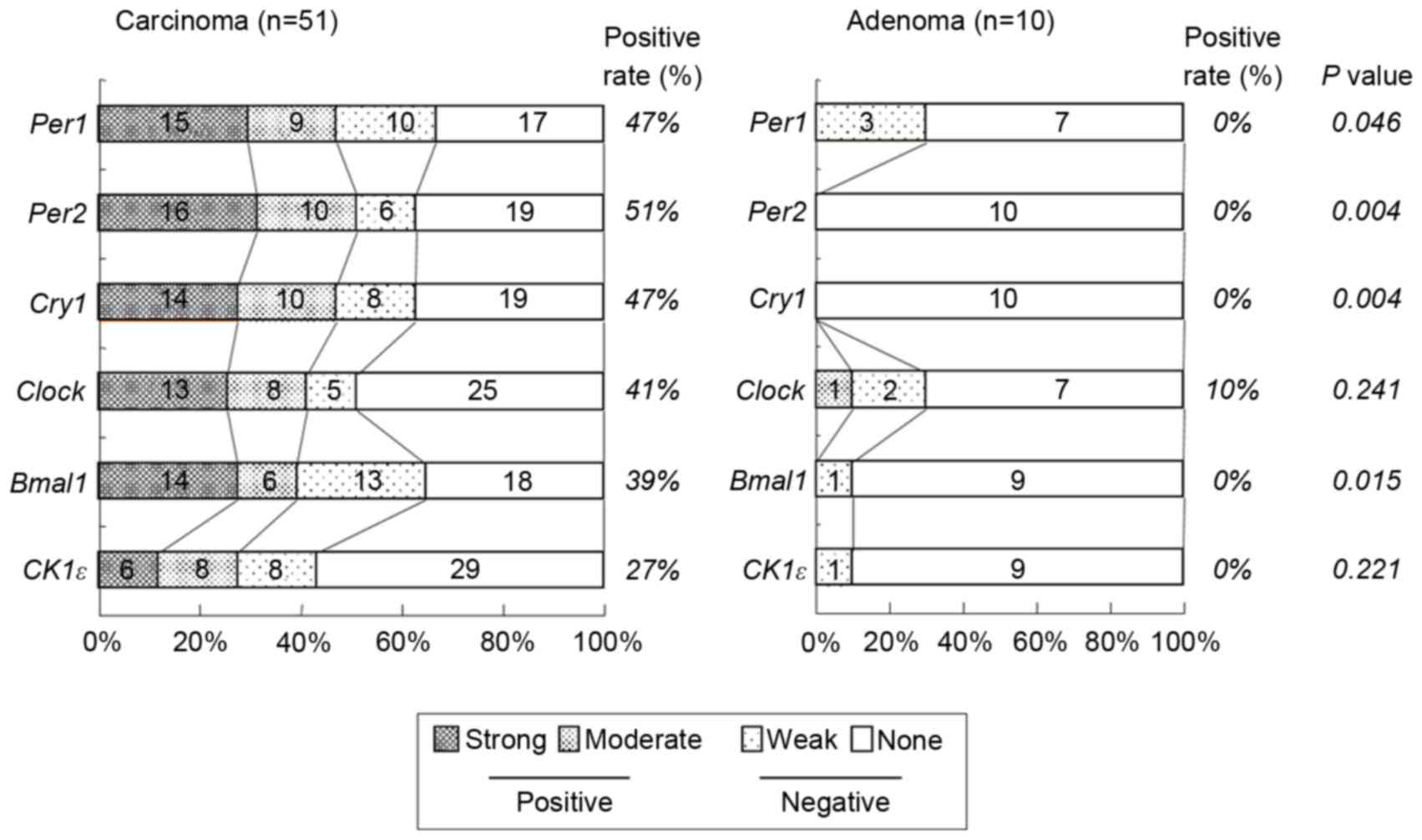|
1
|
Fu L and Lee CC: The circadian clock:
Pacemaker and tumour suppressor. Nat Rev Cancer. 3:350–361. 2003.
View Article : Google Scholar : PubMed/NCBI
|
|
2
|
Hunt T and Sassone-Corsi P: Riding tandem:
Circadian clocks and the cell cycle. Cell. 129:461–464. 2007.
View Article : Google Scholar : PubMed/NCBI
|
|
3
|
Devilee P, Schuuring E, van de Vijver MJ
and Cornelisse CJ: Recent developments in the molecular genetic
understanding of breast cancer. Crit Rev Oncog. 5:247–270. 1994.
View Article : Google Scholar : PubMed/NCBI
|
|
4
|
Ronco A, De Stefani E, Mendilaharsu M and
Deneo-Pellegrini H: Meat, fat and risk of breast cancer: A
case-control study from Uruguay. Int J Cancer. 65:328–331. 1996.
View Article : Google Scholar : PubMed/NCBI
|
|
5
|
Stevens RG, Brainard GC, Blask DE, Lockley
SW and Motta ME: Breast cancer and circadian disruption from
electric lighting in the modern world. CA Cancer J Clin.
64:207–218. 2014. View Article : Google Scholar : PubMed/NCBI
|
|
6
|
Ambrosone CB, Freudenheim JL, Graham S,
Marshall JR, Vena JE, Brasure JR, Michalek AM, Laughlin R, Nemoto
T, Gillenwater KA and Shields PG: Cigarette smoking,
N-acetyltransferase 2 genetic polymorphisms, and breast cancer
risk. JAMA. 276:1494–1501. 1996. View Article : Google Scholar : PubMed/NCBI
|
|
7
|
Magnusson C, Baron J, Persson I, Wolk A,
Bergström R, Trichopoulos D and Adami HO: Body size in different
periods of life and breast cancer risk in post-menopausal women.
Int J Cancer. 76:29–34. 1998. View Article : Google Scholar : PubMed/NCBI
|
|
8
|
Schernhammer ES, Laden F, Speizer FE,
Willett WC, Hunter DJ, Kawachi I, Fuchs CS and Colditz GA:
Night-shift work and risk of colorectal cancer in the nurses'
health study. J Natl Cancer Inst. 95:825–828. 2003. View Article : Google Scholar : PubMed/NCBI
|
|
9
|
Karantanos T, Theodoropoulos G, Pektasides
D and Gazouli M: Clock genes: Their role in colorectal cancer.
World J Gastroenterol. 20:1986–1992. 2014. View Article : Google Scholar : PubMed/NCBI
|
|
10
|
Fu L, Pelicano H, Liu J, Huang P and Lee
C: The circadian gene Period2 plays an important role in tumor
suppression and DNA damage response in vivo. Cell. 111:41–50. 2002.
View Article : Google Scholar : PubMed/NCBI
|
|
11
|
Huisman SA, Oklejewicz M, Ahmadi AR,
Tamanini F, Ijzermans JN, van der Horst GT and de Bruin RW:
Colorectal liver metastases with a disrupted circadian rhythm phase
shift the peripheral clock in liver and kidney. Int J Cancer.
136:1024–1032. 2014. View Article : Google Scholar : PubMed/NCBI
|
|
12
|
Yeh KT, Yang MY, Liu TC, Chen JC, Chan WL,
Lin SF and Chang JG: Abnormal expression of period 1 (PER1) in
endometrial carcinoma. J Patol. 206:111–120. 2005.
|
|
13
|
Shih HC, Choo KB, Chang TJ, Yang MY, Shih
MC, Yeh KT, Liu TC, Lin SF and Chang JG: Disturbance of circadian
gene expression in endometrial cancer: Detection by real-time
quantitative RT-PCR. Oncol Rep. 14:1533–1538. 2005.PubMed/NCBI
|
|
14
|
Chen ST, Choo KB, Hou MF, Yeh KT, Kuo SJ
and Chang JG: Deregulated expression of the PER1, PER2 and PER3
genes in breast cancers. Carcinogenesis. 26:1241–1246. 2005.
View Article : Google Scholar : PubMed/NCBI
|
|
15
|
Sobin LH: World Health Organization
international histological classification of tumors: Histological
typing of intestinal tumors. 2nd. New York: Springer-Verlag;
1989
|
|
16
|
Wood PA, Yang X, Taber A, Oh EY, Ansell C,
Ayers SE, Al-Assaad Z, Carnevale K, Berger FG, Peña MM and
Hrushesky WJ: Period 2 mutation accelerates ApcMin/+ tumorigenesis.
Mol Cancer Res. 6:1786–1793. 2008. View Article : Google Scholar : PubMed/NCBI
|
|
17
|
Yang X, Wood PA, Ansell CM, Ohmori M, Oh
EY, Xiong Y, Berger FG, Peña MM and Hrushesky WJ: Beta-catenin
induces beta-TrCP-mediated PER2 degradation altering circadian
clock gene expression in intestinal mucosa of ApcMin/+ mice. J
Biochem. 145:289–297. 2009. View Article : Google Scholar : PubMed/NCBI
|
|
18
|
Soták M, Polidarová L, Ergang P, Sumová A
and Pácha J: An association between clock genes and
clock-controlled cell cycle genes in murine colorectal tumors. Int
J Cancer. 132:1032–1041. 2013. View Article : Google Scholar : PubMed/NCBI
|
|
19
|
Oshima T, Takenoshita S, Akaike M,
Kunisaki C, Fujii S, Nozaki A, Numata K, Shiozawa M, Rino Y, Tanaka
K, et al: Expression of circadian genes correlates with liver
metastasis and outcomes in colorectal cancer. Oncol Rep.
25:1439–1446. 2011. View Article : Google Scholar : PubMed/NCBI
|
|
20
|
Karantanos T, Theodoropoulos G, Gazouli M,
Vaiopoulou A, Karantanou C, Lymberi M and Pektasides D: Expression
of clock genes in patients with colorectal cancer. Int J Biol
Markers. 28:280–285. 2013. View Article : Google Scholar : PubMed/NCBI
|
|
21
|
Matsuo T, Yamaguchi S, Mitsui S, Emi A,
Shimoda F and Okamura H: Control mechanism of the circadian clock
for timing of cell division in vivo. Science. 302:255–259. 2003.
View Article : Google Scholar : PubMed/NCBI
|
|
22
|
Yagita K, Tamanini F, Yasuda M,
Hoeijmakers JH, van der Horst GT and Okamura H: Nucleocytoplasmic
shuttling and mCRY-dependent inhibition of ubiquitylation of the
mPER2 clock protein. EMBO J. 21:1301–1314. 2002. View Article : Google Scholar : PubMed/NCBI
|



















